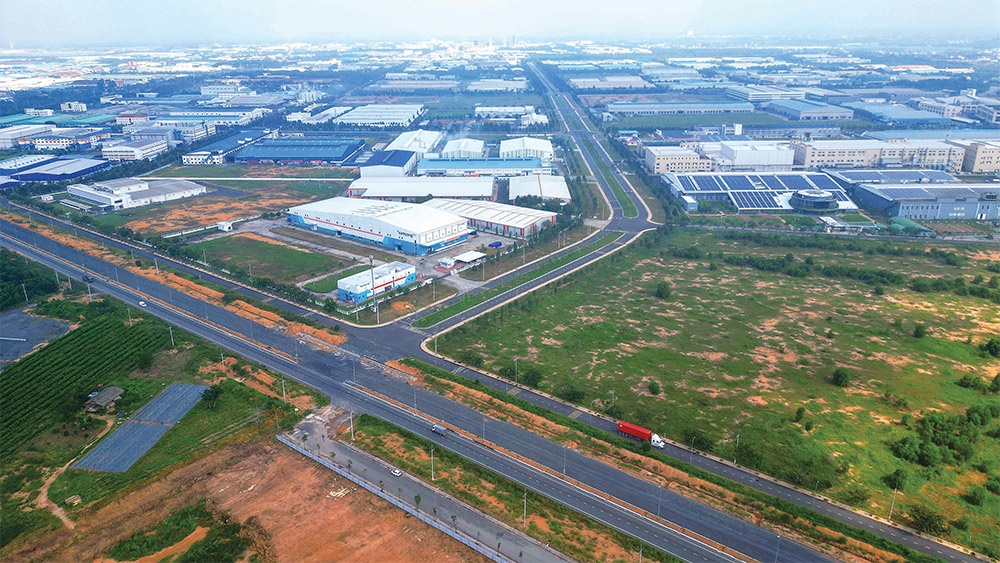Land rent cuts aim for positive impact on business health
The National Assembly Economic and Financial Committee has submitted a draft decree on reducing land rental. The draft, handed to the National Assembly Standing Committee (NASC), is expected to be enacted by the government, pending approval.
 |
| Land rental reduction could help enterprises save costs and boost economic growth in the long run, photo Le Toan |
The aim is to provide more support for businesses and individuals to cope with issues, and at the same time to support organisations and individuals in localities affected by natural disasters and climate change.
Late last year, the government assigned the Ministry of Finance (MoF) to build the draft decree. The seven-article draft shall benefit land users who are directly leased land by the state under a land lease decision or a land lease contract or a land use right certificate, ownership of property affixed to land of a competent state agency in the form of annual land rental payment that was in effect in 2024.
Article 3 of the draft decree stipulated that the reduction of land rental is 30 per cent of the total land rental paid in 2024.
According to a governmental document submitted to the NASC early this month, this decrease in land rental is calculated on the amount of land rental paid in 2024 according to the law. It shall not be applied to the outstanding land rental amount of years prior to 2024 and late payment fees, if any. If the land user is entitled to a reduction in land rental according to regulations or/and is enjoying a deduction for compensation and site clearance money according to the law on land rental, the land rental reduction shall be calculated on the amount of land rental paid (if any) after being reduced or/and deducted according to the law.
In order to benefit from such a reduction, land users shall have to submit to the tax agency a dossier, which includes their request for land rental reduction under a form. They shall be responsible before the law for the truthfulness and accuracy of the information and their request.
Moreover, the dossier must also include a copy of the land lease decision or a land lease contract or rights certificate, and ownership of assets affixed to land issued by a competent state agency. The deadline for the dossier submission is May 31.
The MoF’s Department of Taxation has calculated that this land rental reduction will be valued at around VND4 trillion ($160 million), or 0.26 per cent of the state budget revenue per year, and 9 per cent of total state budget revenue from land rental payment per year.
At a December conference on reviewing tax work in 2024 and implementing related tasks in 2025, the department reported that the total state budget revenue in 2024 managed by the tax authority was estimated at VND1.732 quadrillion ($69.28 billion), equivalent to 116.5 per cent of the estimate (exceeding VND245.587 trillion or $9.82 billion), up 113.7 per cent as compared to the realised figure in 2023.
“Thus, the budget revenue estimate for 2024 has been achieved and exceeded. So, the land rental reduction under this policy does not significantly affect the state budget revenue in general, but it will have a great impact on the recovery and development of production and business of organisations, individuals, households, and businesses,” stated Deputy Minister of Finance Bui Van Khang. “It will help increase budget revenue from taxes, such as personal income tax and corporate income tax, to compensate for the decreased revenue caused by the reduction in land rental.”
Over past years, such a reduction has also been applied to assist enterprises. The government reported that the amount of land and water surface rental reduced according to the prime minister’s decisions for 2020-2023 was VND2.89 trillion ($115.6 million). The average sum for 2021-2023 came in at VND3.734 trillion ($149.36 million).
“This has contributed to supporting businesses, organisations, units, households, and individuals in overcoming difficulties caused by the impact of the COVID-19 pandemic so that they could soon recover production and business activities,” the government document read.
The MoF has also proposed that the government consider and consult the NASC on the development of a governmental decree on the reduction of land rental for the following years under the authority prescribed in the Law on Promulgation of Legal Documents in case of necessity.
| Troy Griffiths, deputy managing director Savills Vietnam
The draft decree includes seven articles that shall benefit land users who are directly leased land by the state under a land lease decision, contract, or rights certificate, with ownership of property affixed to land of a competent state agency in the form of annual land rental payment that was in effect in 2024. Of this, the draft decree stipulated that the reduction of land rental is 30 per cent of the total land rental paid in 2024. Whilst still at an early stage of discussion, these are tremendous policy initiatives, aimed at pursuing economic growth and social reform. They are in concert with a raft of proposals around social housing that is a priority and will allow more economically feasible development to boost this much needed asset class. Other land issues remain under discussion, but the overall theme is to reduce the capital burden of leaseholders, as well as incentivise certain industries and make land recovery fairer. If leaseholders have rental concessions, then they have greater capital to invest in other areas. In agriculture this may be machinery, stock, or seed. In industry property, it may be plant and equipment or factories. Freed of the cost associated with their leasehold, then investment into growth improvements can occur. David Jackson, CEO, Avison Young Vietnam
The reduction would apply to public land leased by the government to businesses for investment, development, and operations. First implemented in 2020 to support businesses during the pandemic, this policy has been extended annually. While not new, it remains a crucial measure to recover production, stimulate business activities, and inject cash flow into the economy. For businesses, households, and individuals paying annual land rent, this reduction eases financial pressure, enabling them to maintain and expand operations. Particularly amid ongoing global trade tariff issues, the policy provides real estate investors with added stability and strategic planning advantages. However, with local governments implementing new land pricing frameworks under the 2024 Land Law, the impact of this reduction varies by province. Ensuring a balanced and competitive real estate market requires thoughtful policy implementation and a long-term vision, allowing businesses and investors to plan effectively for sustainable growth in Vietnam. Nguyen Thi Bich Ngoc, founder and CEO Senvang Group
The policy of a 30 per cent land rent cut for 2024 is a significant financial support measure that helps ease cost pressures for real estate businesses, particularly those leasing land from the state for development. With lower input costs, firms can better manage their cash flow, enhancing their competitiveness and enabling more reasonable sales and rental price adjustments. This will support companies in a market still facing many challenges such as high interest rates, low liquidity, and substantial cost pressures. Furthermore, this policy stimulates investment, particularly in the industrial real estate sector, a segment with high demand and significant potential. Reducing land costs may also encourage new project development, increasing supply, stabilising property prices, and attracting additional foreign direct investment. Despite its advantages, this policy is unlikely to have a lasting effect. Not all businesses will benefit, particularly those that own land or have long-term leases with pre-paid contracts, since the policy will only take effect in 2025. Additionally, its impact is not as significant as the land rent exemption and reduction policies from previous years. To maximise its effectiveness, complementary measures like legal reforms, credit support, and long-term policies are needed to create a more stable business environment for companies. |
 | MoF proposes tax and land rent payment extension for 2025 According to the MoF, this is an extension policy, not a tax exemption or reduction. |
 | National Assembly Standing Committee approves 30 per cent land rent cut At the 43rd session of the Standing Committee of the National Assembly, delegates unanimously approved a decree detailing the implementation of the backdated 2024 land rental reduction bill. |
What the stars mean:
★ Poor ★ ★ Promising ★★★ Good ★★★★ Very good ★★★★★ Exceptional
Related Contents
Latest News
More News
- Dong Nai experiences shifting expectations and new industrial cycle (January 28, 2026 | 09:00)
- An Phat 5 Industrial Park targets ESG-driven investors in Hai Phong (January 26, 2026 | 08:30)
- Decree opens incentives for green urban development (January 24, 2026 | 11:18)
- Public investment is reshaping real estate’s role in Vietnam (January 21, 2026 | 10:04)
- Ho Chi Minh City seeks investor to revive Binh Quoi–Thanh Da project (January 19, 2026 | 11:58)
- Sun Group launches construction of Rach Chiec sports complex (January 16, 2026 | 16:17)
- CEO Group breaks ground on first industrial park in Haiphong Free Trade Zone (January 15, 2026 | 15:47)
- BRIGHTPARK Entertainment Complex opens in Ninh Binh (January 12, 2026 | 14:27)
- Ho Chi Minh City's industrial parks top $5.3 billion investment in 2025 (January 06, 2026 | 08:38)
- Why Vietnam must build a global strategy for its construction industry (December 31, 2025 | 18:57)




 Tag:
Tag:


















 Mobile Version
Mobile Version